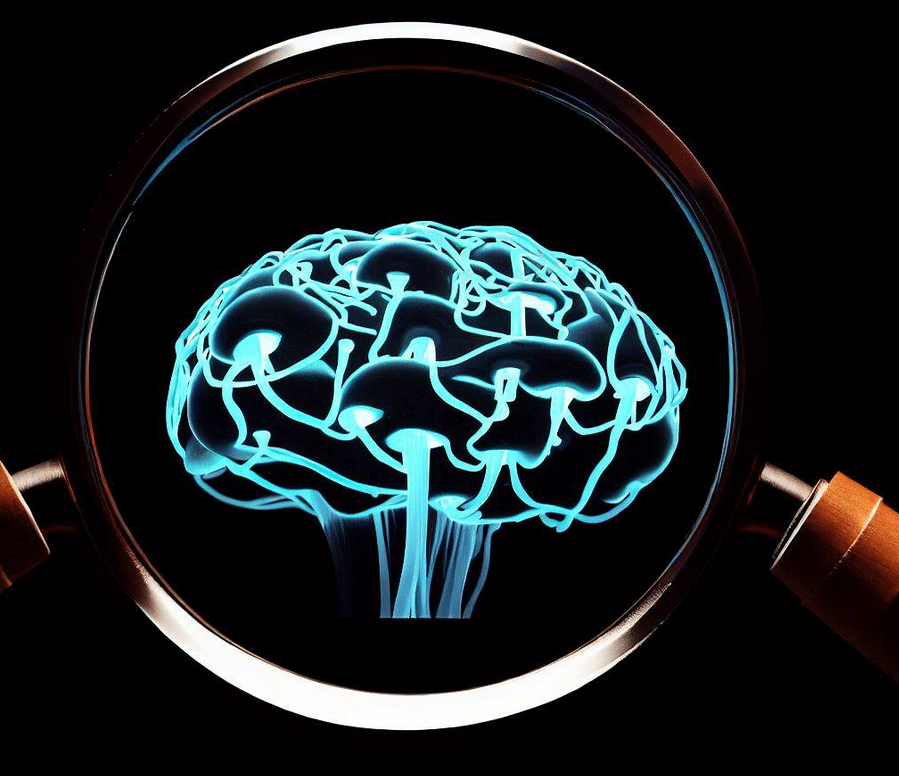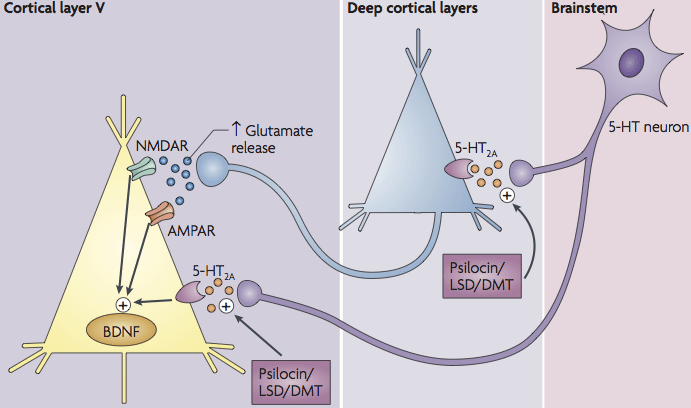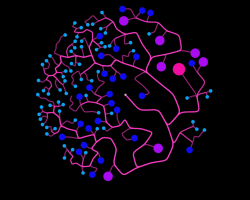Psilocybin and LSD for more neurons
Neurochemistry and BDNF
BDNF stands for Brain Derived Neurotrophic Factor and is a protein that stimulates the growth and survival of nerve cells in the brain. Both psilocybin and LSD are known to increase BDNF release. This is because these substances bind to serotonin receptors in the brain, triggering a chain reaction that leads to the release of BDNF.
When released, BDNF stimulates the growth of new nerve cells and synapses in the brain. This can lead to improved cognitive functions, such as memory and learning ability. BDNF has also been shown to help treat depression, anxiety, and addiction disorders.
It is not yet fully understood how psilocybin and LSD work in the brain, but the increase in BDNF is one of the promising effects that has contributed to research into the therapeutic potential of these substances.

Glutamate also helps
Glutamate is an important neurotransmitter found throughout the brain and implicated in various neuropsychiatric disorders. It also plays a crucial role in neuroplasticity, which refers to the brain's ability to reorganize itself and adapt to changing environments. Glutamate activates N-methyl-D-asparate (NMDA) receptors, leading to changes in synaptic transmission and the eventual formation of new synapses in the brain. It also increases the expression of growth factors such as the aforementioned BDNF, which contributes to the survival and growth of neurons. In the right place in the brain, such as the hippocampus, glutamate plays a key role in learning, memory, and overall neuroplasticity. However, excess glutamate can lead to neuronal hyperexcitability and neurotoxicity, which can contribute to various neurological disorders such as stroke and epilepsy.
5HT2a receptor
The transformation of gene expression in various brain cells is triggered by the interaction of psychedelics like psilocybin and LSD, which have a strong affinity for 5HT2a receptors. The resulting increase in BDNF and glutamate release further alters the physiological state of the brain, contributing to the diverse effects of these substances. Several factors play a role in the use of substances like psilocybin.

Psychedelics against neurodegenerative diseases?
Psilocybin and psychedelics have potential therapeutic applications in neurodegenerative disorders such as multiple sclerosis (MS) and Parkinson's. This is because these substances can increase neuroplasticity, which allows the brain to adapt and create new connections. Neuroplasticity is the brain's ability to adapt and change by creating new neural networks or strengthening existing ones. In neurodegenerative disorders, the brain is damaged, and these mechanisms can be impaired. This can lead to symptoms such as tremors, stiffness, and difficulty moving.
Studies have shown that treatments with psilocybin and psychedelics can increase neuroplasticity and even create new neural connections. This can lead to improved symptoms and overall quality of life in patients with neurodegenerative disorders. While more research is needed to determine the effectiveness and safety of these treatments, psilocybin and psychedelics offer hope for people with neurodegenerative disorders who currently struggle with limited treatment options and symptom relief.
Neuroplasticity in depression
Research has shown that increased neuroplasticity can help alleviate depression because it can reconfigure the brain's reward and emotion systems. This system is often disrupted in people with depression. Increased neuroplasticity can help form new neuronal pathways that help repair this dysfunction. In theory, and according to various scientific studies, psychedelics like psilocybin and LSD can help with depression.
Novel neuroconfiguration against anxiety complaints
Creating a new neuroconfiguration is a consequence of psychedelic therapy and involves retraining the brain to better cope with anxiety. The idea is that anxiety symptoms arise from faulty brain patterns, which can be changed by learning new, healthy ones. The best results are achieved when these techniques are applied to the limbic system, the part of the brain responsible for emotions, motivation, and memory. This area is crucial in the development and maintenance of anxiety symptoms. A changed neuroconfiguration can be effective for people suffering from anxiety and can help them regain a sense of calm and relaxation in daily life.
Ready for a psychedelic session?
Psychedelic sessions are not suitable for everyone, and there are several contraindications that should be considered before deciding to participate in a psychedelic experience. Individuals with a history of mental health conditions such as schizophrenia, bipolar disorder, or psychotic episodes should exercise caution when using psychedelics. Individuals with a history of cardiovascular disease, high blood pressure, liver, or kidney disease should also exercise caution when using psychedelics. Furthermore, individuals taking medications such as antidepressants, antipsychotics, or antihypertensives should exercise caution when using psychedelics due to potential drug interactions. Finally, pregnant and breastfeeding women should avoid using psychedelics due to potential adverse effects on the baby. Therefore, it is important to ensure proper evaluation of your ability to participate in a psychedelic session. Please use the intake form below so we can screen for known contraindications to substances such as MDMA, LSD, psilocybin, and psilohuasca (psiloflora).
